Language
Guitar Nut Materials Guide
A guitar nut is extremely crucial when it comes to the playability, tone and the overall performance of your guitar. A well-constructed nut with quality materials will have an amazing effect on the effectiveness of your instrument. A worn out or poorly built guitar nut can influence your tone for better or worse. This essential little contact point between the strings and wood of your guitar can be constructed from many different materials according to the tone and quality of sound you want to achieve. The materials are discussed below.
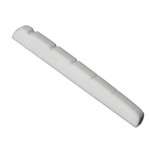 Bone is arguably the best guitar nut construction material since it offers a number of desirable characteristics. Hard, dense, yet fairly light, this material offers remarkable strength against mechanical shocks and a fine tuning reliability, especially if periodically lubricated. What's more, it is relatively durable and provides incredible resonance as well as sustain when properly slotted and installed. That is why it is used in many high-end guitars on the market.
Bone is arguably the best guitar nut construction material since it offers a number of desirable characteristics. Hard, dense, yet fairly light, this material offers remarkable strength against mechanical shocks and a fine tuning reliability, especially if periodically lubricated. What's more, it is relatively durable and provides incredible resonance as well as sustain when properly slotted and installed. That is why it is used in many high-end guitars on the market.
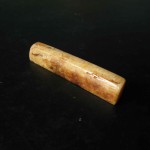 Fossil ivory is quite similar to bone in terms of performance, although it is slightly harder, brighter and a bit difficult to craft. This material is equally impressive as far as its acoustic properties and aesthetics are concerned. For instance, it provides resonance and sustain in equal measure. NB/Non-fossil ivory is a banned material in most countries and in the eyes of most people, morally wrong.
Fossil ivory is quite similar to bone in terms of performance, although it is slightly harder, brighter and a bit difficult to craft. This material is equally impressive as far as its acoustic properties and aesthetics are concerned. For instance, it provides resonance and sustain in equal measure. NB/Non-fossil ivory is a banned material in most countries and in the eyes of most people, morally wrong.
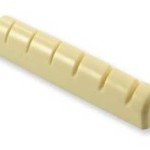 Different plastic materials including Corian and Micarta can be used to craft guitar nuts. However, plastic is not so appealing because it offers poor sound properties. Plastic nuts fail a good number of the specifications for a great nut material. Unfortunately, many guitars come with plastic nuts due to their low-cost.
Different plastic materials including Corian and Micarta can be used to craft guitar nuts. However, plastic is not so appealing because it offers poor sound properties. Plastic nuts fail a good number of the specifications for a great nut material. Unfortunately, many guitars come with plastic nuts due to their low-cost.
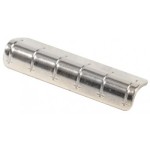 These vital small contact points between the strings and wood of a guitar may also feature metal, especially brass and steel as the underlying material. As far as tonal properties are concerned, metal is fairly rated. The main advantage of having a guitar nut that is made out of this material is durability. A steel or brass nut will last for a long time with minimum maintenance.
These vital small contact points between the strings and wood of a guitar may also feature metal, especially brass and steel as the underlying material. As far as tonal properties are concerned, metal is fairly rated. The main advantage of having a guitar nut that is made out of this material is durability. A steel or brass nut will last for a long time with minimum maintenance.
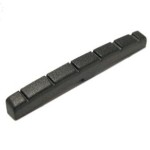 Graphite is also another popular material for nut construction. The major advantage to this material is that it is self-lubricating for low friction. Also, a good graphite nut offers impeccable tuning stability and a variety of tremolo effects. Cheap graphite nuts, however, tend to kill these advantages.
Graphite is also another popular material for nut construction. The major advantage to this material is that it is self-lubricating for low friction. Also, a good graphite nut offers impeccable tuning stability and a variety of tremolo effects. Cheap graphite nuts, however, tend to kill these advantages.
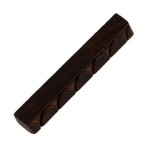 Ebony too can be used as a material for nut construction in a guitar. It looks perfect and sounds incredible. The major downside to this guitar nut material is that it softens quicker than its counterparts.
The nut plays a vital role when it comes to the sound your guitar produces. While bone seems to be the best all around choice, don't be afraid to experiment with the other choices -- as long as it's not ivory!
Ebony too can be used as a material for nut construction in a guitar. It looks perfect and sounds incredible. The major downside to this guitar nut material is that it softens quicker than its counterparts.
The nut plays a vital role when it comes to the sound your guitar produces. While bone seems to be the best all around choice, don't be afraid to experiment with the other choices -- as long as it's not ivory!
 Great Gear For Solo Performers[/caption]
[caption id="attachment_4586" align="alignleft" width="150"]
Great Gear For Solo Performers[/caption]
[caption id="attachment_4586" align="alignleft" width="150"] Finding The Right Recording Studio[/caption]
[caption id="attachment_5623" align="alignleft" width="150"]
Finding The Right Recording Studio[/caption]
[caption id="attachment_5623" align="alignleft" width="150"] Using EQ To Remove 60-Cycle Hum[/caption]
Using EQ To Remove 60-Cycle Hum[/caption]
Guitar Nut Material Types
Bone
 Bone is arguably the best guitar nut construction material since it offers a number of desirable characteristics. Hard, dense, yet fairly light, this material offers remarkable strength against mechanical shocks and a fine tuning reliability, especially if periodically lubricated. What's more, it is relatively durable and provides incredible resonance as well as sustain when properly slotted and installed. That is why it is used in many high-end guitars on the market.
Bone is arguably the best guitar nut construction material since it offers a number of desirable characteristics. Hard, dense, yet fairly light, this material offers remarkable strength against mechanical shocks and a fine tuning reliability, especially if periodically lubricated. What's more, it is relatively durable and provides incredible resonance as well as sustain when properly slotted and installed. That is why it is used in many high-end guitars on the market.
Fossil Ivory
 Fossil ivory is quite similar to bone in terms of performance, although it is slightly harder, brighter and a bit difficult to craft. This material is equally impressive as far as its acoustic properties and aesthetics are concerned. For instance, it provides resonance and sustain in equal measure. NB/Non-fossil ivory is a banned material in most countries and in the eyes of most people, morally wrong.
Fossil ivory is quite similar to bone in terms of performance, although it is slightly harder, brighter and a bit difficult to craft. This material is equally impressive as far as its acoustic properties and aesthetics are concerned. For instance, it provides resonance and sustain in equal measure. NB/Non-fossil ivory is a banned material in most countries and in the eyes of most people, morally wrong.
Plastic
 Different plastic materials including Corian and Micarta can be used to craft guitar nuts. However, plastic is not so appealing because it offers poor sound properties. Plastic nuts fail a good number of the specifications for a great nut material. Unfortunately, many guitars come with plastic nuts due to their low-cost.
Different plastic materials including Corian and Micarta can be used to craft guitar nuts. However, plastic is not so appealing because it offers poor sound properties. Plastic nuts fail a good number of the specifications for a great nut material. Unfortunately, many guitars come with plastic nuts due to their low-cost.
Metal
 These vital small contact points between the strings and wood of a guitar may also feature metal, especially brass and steel as the underlying material. As far as tonal properties are concerned, metal is fairly rated. The main advantage of having a guitar nut that is made out of this material is durability. A steel or brass nut will last for a long time with minimum maintenance.
These vital small contact points between the strings and wood of a guitar may also feature metal, especially brass and steel as the underlying material. As far as tonal properties are concerned, metal is fairly rated. The main advantage of having a guitar nut that is made out of this material is durability. A steel or brass nut will last for a long time with minimum maintenance.
Graphite
 Graphite is also another popular material for nut construction. The major advantage to this material is that it is self-lubricating for low friction. Also, a good graphite nut offers impeccable tuning stability and a variety of tremolo effects. Cheap graphite nuts, however, tend to kill these advantages.
Graphite is also another popular material for nut construction. The major advantage to this material is that it is self-lubricating for low friction. Also, a good graphite nut offers impeccable tuning stability and a variety of tremolo effects. Cheap graphite nuts, however, tend to kill these advantages.
Ebony
 Ebony too can be used as a material for nut construction in a guitar. It looks perfect and sounds incredible. The major downside to this guitar nut material is that it softens quicker than its counterparts.
The nut plays a vital role when it comes to the sound your guitar produces. While bone seems to be the best all around choice, don't be afraid to experiment with the other choices -- as long as it's not ivory!
Ebony too can be used as a material for nut construction in a guitar. It looks perfect and sounds incredible. The major downside to this guitar nut material is that it softens quicker than its counterparts.
The nut plays a vital role when it comes to the sound your guitar produces. While bone seems to be the best all around choice, don't be afraid to experiment with the other choices -- as long as it's not ivory!
Your Turn to Sound Off!
What type of nut does your guitar currently use?Let us know in the comment section below!
Check out more Musician Resources articles below!
[caption id="attachment_5067" align="alignleft" width="150"] Great Gear For Solo Performers[/caption]
[caption id="attachment_4586" align="alignleft" width="150"]
Great Gear For Solo Performers[/caption]
[caption id="attachment_4586" align="alignleft" width="150"] Finding The Right Recording Studio[/caption]
[caption id="attachment_5623" align="alignleft" width="150"]
Finding The Right Recording Studio[/caption]
[caption id="attachment_5623" align="alignleft" width="150"] Using EQ To Remove 60-Cycle Hum[/caption]
Using EQ To Remove 60-Cycle Hum[/caption]
